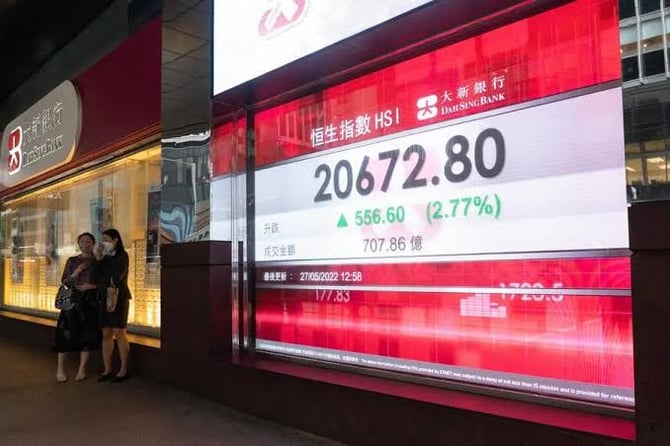Hong Kong Stocks Falter on Concerns Over Chinese Banks

On Thursday, Hong Kong stocks experienced their most significant decline in four months following Goldman Sachs' downgrade of major Chinese banks due to local government debt risks and the US Federal Reserve's hawkish outlook.
The Hang Seng (HSI) Index concluded the day with a 3% drop, marking its largest daily decrease since early March. The Hang Seng Mainland Banks Index, which monitors mainland Chinese banks listed in Hong Kong, experienced a steep decline of 6.5%. This represents the most substantial daily drop since February 2018.
In other parts of the region, Japan's Nikkei 225 (N225) fell by 1.7%, while South Korea's Kospi lost 0.9%. China's Shanghai Composite also shed 0.5%.
Goldman Sachs lowered its ratings for the Industrial and Commercial Bank of China and Industrial Bank from "buy" to "sell." It downgraded the Agricultural Bank of China from "neutral" to "sell." The Bank of Communications and Huaxia Bank received a "sell" rating.
These banks face potential earnings risks due to their exposure to local government debt in China. The country's zero-Covid campaign has depleted the budgets of various regional governments, which expended substantial amounts on frequent Covid lockdowns, widespread testing, and quarantine centersprior to a policy shift in December of last year.
What does this mean for me?
Market sentiment was also influenced by the Fed's hawkish stance on interest rates. Fed officials anticipate further rate hikes this year due to persistently "unacceptably high" inflation.
Ongoing geopolitical tensions, concerns regarding the decoupling of the US and China, and China's internal growth challenges continue to fuel pessimistic arguments about the country's risk markets.
More News
.webp)
Japan’s Rate Shift Is Rippling Through Global Bond Markets
1 week ago

China’s Growth Engine Stalls as Consumers and Investors Pull Back
1 week ago

Egypt’s Recovery Gains Traction as Household Pressure Lingers
2 weeks ago

OECD Warns AI and Tariffs Will Test the Global Economy
3 weeks ago

Zero Tariffs, Higher Drug Bills as US and UK Reset Pharma Trade
3 weeks ago

Catastrophe Bonds Go Global as Climate Risk Meets Yield Hunting
4 weeks ago
.webp)
Canada Shields Steel and Lumber Industries From Tariffs
1 month ago

Trump Drops Selected Tariffs in Response to Inflation Pressures
1 month ago